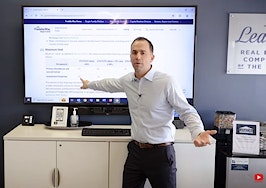No one can predict the future of real estate, but you can prepare. Find out what to prepare for and pick up the tools you’ll need at Virtual Inman Connect on Nov. 1-2, 2023. And don’t miss Inman Connect New York on Jan. 23-25, 2024, where AI, capital and more will be center stage. Bet big on the future and join us at Connect.
Mortgage rates retreated Friday after Federal Reserve Chair Jerome Powell agreed with some of his colleagues that the recent runup in long-term bond yields is probably helping the central bank cool the economy and curb inflation.
In an interview at the Economic Club of New York Thursday, Powell acknowledged that in principle, elevated term premiums — higher rates of return bond investors are demanding to compensate them for risk — could reduce the need for further Fed rate hikes.
Yields on 10-year Treasury notes, a barometer for mortgage rates, fell 6 basis points Friday — the first drop in a week. Rates on 30-year fixed-rate loans, which breached 8 percent on Thursday, retreated by the same margin Friday, to 7.97 percent, according to an index maintained by Mortgage News Daily.
While Powell made no promises that the Fed is done hiking rates, his views on the impact that higher term premiums could have in helping the central bank achieve its inflation target of 2 percent made headlines.
The Fed chair staked out a position that’s aligned with colleagues Lorie Logan and Philip Jefferson, who last week said the recent runup in long-term Treasury yields could reflect not only investor fears of future Fed rate hikes but also changes in investors’ attitudes toward risk and uncertainty in general.
“There are those who suggest, including some colleagues in the Fed, that maybe the bond market is doing part of your job for you,” Bloomberg’s David Westin asked Powell. “Is that the way you see it?”
Powell agreed that to the extent that higher bond rates are not going up just because bond markets expect more Fed rate hikes, “that’s a tightening, that’s exactly what we’re trying to achieve.”
If that’s the case, Westin asked, “It seems like almost arithmetic, it must reduce some of the impetus for you to continue to raise rates?”
“At the margin it could. That remains to be seen,” Powell cautioned. “I’m not blessing any particular level of longer term rates. But just in principle, that’s right.”
Powell’s remarks convinced more investors that the Fed is done raising rates. Futures markets tracked by the CME FedWatch Tool now see no chance that the Fed will hike rates at its Nov. 1 meeting, and only a 24 percent chance of a rate hike when Fed policymakers hold their final meeting of the year on Dec. 13.
The day before Powell’s remarks, the CME FedWatch Tool on Wednesday had put the odds of at least one Fed rate hike by the end of the year at 37 percent.
After implementing 11 rate increases since March 2022 that brought the short-term federal funds rate to a 22-year high of 5.25 percent to 5.5 percent, Fed policymakers haven’t raised rates since July.
But the Fed doesn’t have direct control over long-term bond yields and mortgage rates, which have continued to climb in anticipation that strong economic data will force the Fed to pursue a “higher for longer” strategy next year.
Long-term rates have also been under pressure as the Fed trims its massive holdings of government bonds and Treasurys, much of which it purchased during the pandemic to keep the economy from crashing by encouraging borrowing.
During the pandemic, the Fed was buying $80 billion in long-term Treasury notes and $40 billion in mortgage-backed securities (MBS) every month. The central bank’s $120 billion in monthly “quantitative easing” helped push mortgage rates to record lows — and the Fed’s balance sheet to record highs.
Fed continues trimming its balance sheet
Source: Board of Governors of the Federal Reserve System, Federal Reserve Bank of St. Louis
With inflation still running hotter than the Fed would like, the central bank is now letting $35 billion in maturing MBS and $60 billion in Treasurys roll off its balance sheet each month.
The “spread” between 30-year fixed-rate mortgages and 10-year Treasury yields has grown wider over the last two years, making it more expensive for homebuyers to take out a mortgage. To bring the spread back down, the Mortgage Bankers Association has urged the Fed to make clear it has no intention of increasing the pace of “quantitative tightening” by selling MBS, rather than simply letting expiring assets roll off its books.
Three housing and lending industry trade groups — the National Association of Realtors, the Independent Community Bankers of America and the Community Home Lenders of America — have gone further, pleading with the Fed to stop letting MBS run off its books. That would require the central bank to replace maturing MBS by purchasing an equal amount of new ones.
Powell acknowledged that “QT” — quantitative tightening — could be one factor driving up long-term rates. But he gave no indication that the Fed will slow down the pace of its balance sheet tapering, as “inflation is still too high.”
In addition to the Fed’s balance sheet tightening, Powell said term premiums could be up because investors may have “a heightened focus on fiscal deficits” — government borrowing — and are less likely to view bonds as a safe alternative to the stock market.
“Another one you hear very often is the changing correlation between bonds and equities,” Powell said. “If we’re going forward into a world of more supply shocks rather than demand shocks, that could make bonds a less attractive hedge [against] equities, and therefore you need to be paid more to own bonds and therefore term premium goes up.”
He said the question for Fed policymakers is whether elevated term premiums are here to stay, or if long-term rates will come back down when the Fed signals that it’s done hiking rates.
“Persistence, it will be a matter of just seeing with our own eyes,” Powell said. “But certainly if you look at financial conditions, indexes, they’re showing tightening, and it’s a lot, because of longer rates.”
“Then the question is, is it endogenous?” he continued. “And is it just because the market expects us to take further actions to tighten monetary policy? In which case you have to follow through. But that doesn’t seem to be the case — it doesn’t seem to be principally about expectations of us doing more, it seems that the other factors are the more prominent ones.”
With the Fed at or near the end of its rate hike campaign, the question for investors who fund most mortgages is how long the Fed will keep rates elevated. The “dot plot” from the Fed’s last meeting shows most policymakers expect to bring rates down by only half a percentage point next year as the Fed carries out a “higher for longer” strategy.
Futures markets bet rates will stay ‘higher for longer’

Probable federal funds rate in December 2024. Source: Futures markets tracked by CME FedWatch Tool
The Fed’s current target for the federal funds rate — 5.25 percent to 5.50 percent — is the highest in 22 years. The CME FedWatch Tool, which tracks futures markets to calculate the probability of the Fed’s next moves, shows futures markets predict only a 31 percent chance that Fed policymakers will bring the short-term federal funds rate down by a full percentage point or more next year.
It takes time for Fed tightening to have the desired effect on inflation, and “there’s a lot of uncertainty around lags,” Powell said. “One of the reasons why we have slowed down significantly this year is to give monetary policy time to work.”
Demand for mortgages hit the lowest level in 28 years last week, and homebuyer pessimism climbed to a new record high in September, with 84 percent of Americans polled by Fannie Mae saying it was a bad time to buy a home.
Powell acknowledged that “if you look at interest-sensitive spending, these are very much the places where we expect to see and do see effects.”
“The housing sector has been very affected by higher rates, as have purchases of durable goods. If you look at surveys, people will not say that it’s a good time to buy a car or a house — quite the contrary,” Powell said. “So we see policy working through its usual channels. It may just be that rates haven’t been high enough for long enough.”
Get Inman’s Mortgage Brief Newsletter delivered right to your inbox. A weekly roundup of all the biggest news in the world of mortgages and closings delivered every Wednesday. Click here to subscribe.












